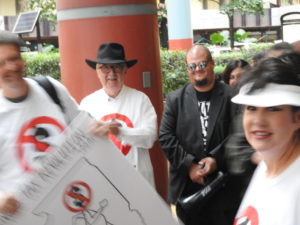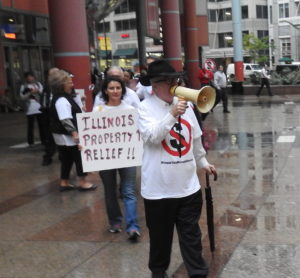View as PDF Chicago — On October 12, 2016, dozens of Illinois taxpayers from Taxpayers United of America (TUA) and Illinois Tax Revolution (ITR) converged on the Thompson Center in downtown Chicago to protest devastating property tax hikes, calling for immediate reforms at the local and state level.
ITR co-founders Bob Anderson of Wonder Lake, Joe Tirio of Woodstock, and Dan Aylward of McHenry have organized two previous tax protests since founding their new grassroots movement this past summer. They made headlines earlier this year when members of the newly formed group began paying the first and second installments of their property tax bills in dollar bills.
 Working with TUA, both groups are pursuing systemic changes to local and state government in Illinois, including property tax relief, government pension reform, and consolidating school districts and the roughly 7,000 taxing bodies in Illinois, or eliminating some of them altogether.
Working with TUA, both groups are pursuing systemic changes to local and state government in Illinois, including property tax relief, government pension reform, and consolidating school districts and the roughly 7,000 taxing bodies in Illinois, or eliminating some of them altogether.
“The Cato Institute recently published its annual Freedom in the 50 States analysis, and unfortunately for our residents, Illinois is ranked 44th for fiscal, regulatory, and personal freedom policies overall,” said Jared Labell, executive director of Taxpayers United of America (TUA).
“The study clearly explains why Illinois is one of the most fiscally irresponsible states today. Whether it’s regarding local taxes (ranked 49th), government subsidies (ranked 47th), government debt (ranked 44th), or overall fiscal policy (ranked 48th), Illinois’ state and local governments are getting away with highway robbery every day that they operate on taxpayers’ dollars without implementing long-lasting reforms to solve their perpetual fiscal nightmare.”
 “Illinoisans’ residential property-tax burden has risen by 76 percent in the last quarter-century. In the span of just a few decades, residential taxpayers now pay more than two-thirds of all property taxes in Illinois, which has the second-highest residential property taxes in the country.”
“Illinoisans’ residential property-tax burden has risen by 76 percent in the last quarter-century. In the span of just a few decades, residential taxpayers now pay more than two-thirds of all property taxes in Illinois, which has the second-highest residential property taxes in the country.”
“We are proud to be working alongside the members of Illinois Tax Revolution in our pursuit of rolling back property taxes, reforming government pensions, and eliminating financially burdensome and unnecessary taxing bodies in Illinois,” said Labell.
“Our concerns will be taken to Springfield during the fall veto session, and we intend to speak with the leadership of the Illinois General Assembly and Gov. Rauner (R) to ensure that government officials hear our grievances loud and clear. With the help of our supporters and taxpayers across Illinois, there is no doubt that our message will be heard and addressed.”
“Nearly forty years after TUA’s founder and president, Jim Tobin, led his successful property tax strike, another tax revolt is on the horizon and portends to be more widespread. Taxpayer outrage can only be quelled by reducing the tax burden currently smothering average folks across Illinois,” said Labell. “The politicians would prefer that we remained silent, but we have a message for the taxpayers of Illinois: Taxes are revolting, why aren’t you?”
Illinois Tax Revolution and Taxpayers United of America held a property tax protest in downtown Chicago on Wednesday, October 12, 2016, which was covered by Northwest Herald.
About 45 McHenry and Lake County residents braved a cool and occasionally rainy day Wednesday to protest in downtown Chicago for lower taxes.
Most of the protesters took the train downtown from the Pingree Road Metra station. Among them were group co-founders Bob Anderson and Joe Tirio.
“We’re here to continue to build up our coalition, and to bring the message to the people of Chicago and Springfield that the people are tired of the taxes, and we’re looking for citizens and elected officials to take action,” said Tirio, of Woodstock, who is running for McHenry County recorder on a platform of eliminating the office altogether.
Anderson, a Wonder Lake barber and longtime activist for eliminating township government, said he was happy with the turnout. He spent the months leading up to the protest encouraging people and his customers to attend to make their voices heard.
“There’s certainly enough people here to make sure that McHenry County has a strong voice,” Anderson said.
Several members of the group got a 20-minute audience with the governor’s constituent outreach staff, Tirio said.
The group was founded in the wake of the publicity and support created when McHenry resident Dan Aylward, another of the group’s co-founders, went to the treasurer’s office in June to pay the first installment of his $11,468.38 property tax bill in dollar bills. Aylward, who has said he is being taxed out of a home that has been in his family for more than a century, returned Aug. 31 to pay his second installment in singles, this time joined by three other taxpayers who did the same.
Treasurer’s offices don’t decide tax bills. They only collect what taxing bodies charge, a fact the group knows well. But the sheer number of taxing bodies in Illinois makes other forms of protest, or attending more than a small fraction of their meetings to ask for tax relief, a challenge.
Illinois has about 7,000 units of local government, far more than any other state. On top of county and township governments and community college districts, McHenry County property tax bills include school districts – often several of them – municipal government and special units such as park and library districts.
The state has the highest or second-highest average property tax burden of all 50 states, depending on the study; and a Washington, D.C.-based tax watchdog group places McHenry County’s burden as the 29th highest by county nationwide.
A poll released Monday concluded that almost half of Illinois residents want to leave – and the top reason most cited by the 1,000 voters polled was the tax burden. Census data released this year not only placed Illinois at the top for out-migration, but also for the first time put the number of people moving out at more than 100,000 people.
Among the group’s priorities are property tax reduction, pension reform, consolidation of school districts and paring down the number of taxing bodies through either consolidation or elimination.




